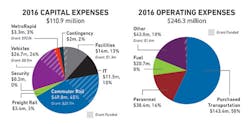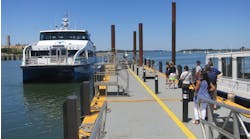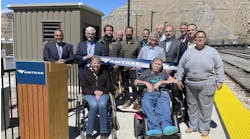The Capital Metro board of directors on Sept. 28, approved the agency’s $357.2 million budget for Fiscal Year 2016, along with the proposed service changes for January. The FY2016 budget will take effect Oct. 1.
FY 2016 Budget
By a unanimous vote, the board of directors adopted a $357.2 million budget, which includes $246.3 million for operating expenses and $110.9 million for capital projects. Major investments planned in FY2016 include:
- Adding express service on MoPac managed lanes.
- Maintaining high-frequency bus routes.
- Making significant investments in replacing buses and vans for MetroBus and MetroAccess.
In addition, the adopted budget positions Capital Metro to begin the double tracking and other rail improvements along the Red Line that will double frequency and capacity on MetroRail. It also includes funding to increase capacity at the Lakeline and Howard Park & Rides, and continue the agency’s work with cities outside the current service area to provide much-needed transportation service to some of the fastest growing areas in the region, including Georgetown, Pflugerville, Round Rock, Hutto and Buda.
The budget reflects a fund balance projection of $97.2 million by the end of FY2016. Of this amount, Capital Metro plans to set aside $36 million in reserves for two months of operating expenses, which meets the level set forth by the Texas Legislature, $1 million for a self-insurance reserve, $26 million for City of Austin mobility programs and $7 million to begin funding a budget stabilization reserve. Using this approach will leave $27.2 million for state of good repair projects and future capital investments, such as new bus purchases to support expanded service and additional MetroRapid stations, all necessary improvements. The board also approved Capital Metro’s updated five-year capital improvement plan.
“Our financial discipline is our commitment to taxpayers to continue delivering high-quality and effective service,” said Capital Metro President/CEO Linda Watson. “With this balanced budget, we will be able to fully fund our current network of services while also beginning the work to expand other services to improve regional mobility, including major enhancements along the Red Line, which leverage state and federal dollars brought back to Austin.”
Capital Metro’s fiscal year runs from Oct. 1 to Sept. 30.
January Service Changes
Capital Metro’s January Service Changes and its Service Guidelines & Standards were also approved unanimously by the Capital Metro board.
The service changes are designed to improve the rider experience while also maintaining system efficiency and expanding service. The changes will go into effect Jan. 10.
Capital Metro’s Service Guidelines and Standards provide a set of criteria by which services can be assessed and informed decisions can be made regarding transit resource allocation. This document, updated on a biennial basis, reflects the agency’s mission and goals of providing both efficient and equitable transit services and will go in effect immediately.
Route Changes
Route 110 South Central Flyer
At Slaughter Lane, the route will move from Palace Parkway to United Kingdom. The change to routing will improve trip directness and provide closer access to new developments. Existing bus stops along the route will not change.
Route 214 Northwest Feeder
Capital Metro is working with the Lago Vista community to provide improvements to service in the area. Based on customer feedback collected at a June transit planning workshop, Capital Metro will provide minor route and schedule adjustments using existing resources. Additionally, the agency will continue working with surrounding communities to establish transit development plans in order to expand service and establish new routes.
Route 237 Northeast Feeder
Capital Metro will take advantage of available resources to introduce an additional vehicle along route 237 Northeast Feeder to serve portions of Johnny Morris Road, Daffin Lane, and Decker Lane. MetroAccess service will also be expanded in accordance with existing policies based on final routing.
Minor Schedule Adjustments
Select routes will receive minor adjustments to schedules in order to provide more reliable service by improving on-time and system performance.
The agency performs a continuous analysis of its service, and makes adjustments three times a year to streamline and improve service, and accommodate changes to ridership along routes. Prior to each service change, the agency does community outreach to obtain feedback from the public. All changes are in accordance with Capital Metro’s Service Guidelines and Standards.



